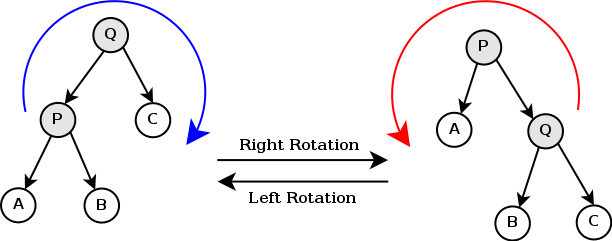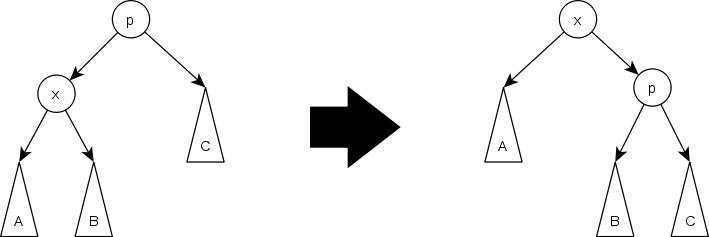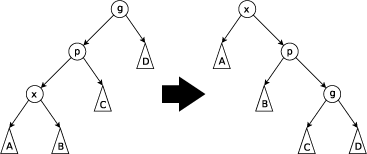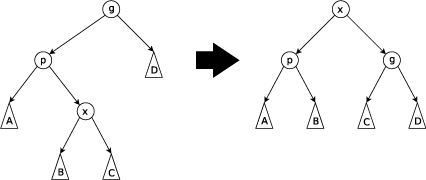splay tree
类别:二叉排序树
空间效率:O(n)
时间效率:O(log n)内完成插入、查找、删除操作




时间效率:O(log n)内完成插入、查找、删除操作
创造者:Daniel Sleator和Robert Tarjan
优点:每次查询会调整树的结构,使被查询频率高的条目更靠近树根。
注:所有图片来自wiki。
注:所有图片来自wiki。

树的旋转是splay的基础,对于二叉查找树来说,树的旋转不破坏查找树的结构。
Splaying是Splay Tree中的基本操作,为了让被查询的条目更接近树根,Splay Tree使用了树的旋转操作,同时保证二叉排序树的性质不变。
Splaying的操作受以下三种因素影响:
- 节点x是父节点p的左孩子还是右孩子
- 节点p是不是根节点,如果不是
- 节点p是父节点g的左孩子还是右孩子
同时有三种基本操作:

当p为根节点时,进行zip step操作。
当x是p的左孩子时,对x右旋;
当x是p的右孩子时,对x左旋。

当p不是根节点,且x和p同为左孩子或右孩子时进行Zig-Zig操作。
当x和p同为左孩子时,依次将p和x右旋;
当x和p同为右孩子时,依次将p和x左旋。

当p不是根节点,且x和p不同为左孩子或右孩子时,进行Zig-Zag操作。
当p为左孩子,x为右孩子时,将x左旋后再右旋。
当p为右孩子,x为左孩子时,将x右旋后再左旋。
Splay Tree可以方便的解决一些区间问题,根据不同形状二叉树先序遍历结果不变的特性,可以将区间按顺序建二叉查找树。
每次自下而上的一套splay都可以将x移动到根节点的位置,利用这个特性,可以方便的利用Lazy的思想进行区间操作。
对于每个节点记录size,代表子树中节点的数目,这样就可以很方便地查找区间中的第k小或第k大元素。
对于一段要处理的区间[x, y],首先splay x-1到root,再splay y+1到root的右孩子,这时root的右孩子的左孩子对应子树就是整个区间。
这样,大部分区间问题都可以很方便的解决,操作同样也适用于一个或多个条目的添加或删除,和区间的移动。
http://poj.org/problem?id=2764
http://blog.csdn.net/cyberzhg/article/details/8058154
http://blog.csdn.net/cyberzhg/article/details/8058154
区间不会重叠,所以不可能有首首相同或尾尾相同的情况,读入所有区间,按照右端由小到大排序。然后通过维护splay进行第k小元素的查询操作。
- #include <cstdio>
- #include <cstring>
- #include <algorithm>
- using namespace std;
- const int MAXN = 100005;
- const int MAXM = 50005;
- const int INF = 0x7FFFFFFF;
- class SplayTree
- {
- public:
- SplayTree()
- {
- nil = &_nil;
- _nil.value = 0;
- _nil.size = 0;
- _nil.parent = nil;
- _nil.child[LEFT] = nil;
- _nil.child[RIGHT] = nil;
- }
- inline void clear()
- {
- nodeNumber = 0;
- root = nil;
- insert(-INF);
- insert(INF);
- }
- inline void insert(const int value)
- {
- if(root == nil)
- {
- root = newNode(nil, value);
- return;
- }
- Node *x = root;
- while(true)
- {
- int dir = x->value < value;
- if(x->child[dir] == nil)
- {
- x->child[dir] = newNode(x, value);
- update(x);
- splay(x->child[dir], nil);
- return;
- }
- else
- {
- x = x->child[dir];
- }
- }
- }
- inline void remove(const int value)
- {
- int k = find(value);
- find(k - 1, nil);
- find(k + 1, root);
- root->child[RIGHT]->child[LEFT] = nil;
- update(root->child[RIGHT]);
- update(root);
- }
- inline int getKth(const int k)
- {
- find(k + 1, nil);
- return root->value;
- }
- inline void print()
- {
- printf("Splay Tree: \n");
- print(root);
- printf("\n");
- }private:
- static const int LEFT = 0;
- static const int RIGHT = 1;
- struct Node
- {
- int value, size;
- Node *parent, *child[2];
- } _nil, node[MAXN];
- int nodeNumber;
- Node *root, *nil;
- inline Node *newNode(Node *parent, const int value)
- {
- node[nodeNumber].value = value;
- node[nodeNumber].size = 1;
- node[nodeNumber].parent = parent;
- node[nodeNumber].child[LEFT] = nil;
- node[nodeNumber].child[RIGHT] = nil;
- return &node[nodeNumber++];
- }
- inline void update(Node *x)
- {
- if(x == nil)
- {
- return;
- }
- x->size = x->child[LEFT]->size + x->child[RIGHT]->size + 1;
- }
- inline void rotate(Node *x, const int dir)
- {
- Node *p = x->parent;
- p->child[!dir] = x->child[dir];
- p->child[!dir]->parent = p;
- x->child[dir] = p;
- x->parent = p->parent;
- if(p->parent->child[LEFT] == p)
- {
- p->parent->child[LEFT] = x;
- }
- else
- {
- p->parent->child[RIGHT] = x;
- }
- p->parent = x;
- update(p);
- update(x);
- if(root == p)
- {
- root = x;
- }
- }
- inline void splay(Node *x, Node *y)
- {
- while(x->parent != y)
- {
- if(x->parent->parent == y)
- {
- if(x->parent->child[LEFT] == x)
- {
- rotate(x, RIGHT);
- }
- else
- {
- rotate(x, LEFT);
- }
- }
- else if(x->parent->parent->child[LEFT] == x->parent)
- {
- if(x->parent->child[LEFT] == x)
- {
- rotate(x->parent, RIGHT);
- rotate(x, RIGHT);
- }
- else
- {
- rotate(x, LEFT);
- rotate(x, RIGHT);
- }
- }
- else
- {
- if(x->parent->child[RIGHT] == x)
- {
- rotate(x->parent, LEFT);
- rotate(x, LEFT);
- }
- else
- {
- rotate(x, RIGHT);
- rotate(x, LEFT);
- }
- }
- update(x);
- }
- }
- inline void find(int k, Node *y)
- {
- Node *x = root;
- while(k != x->child[LEFT]->size + 1)
- {
- if(k <= x->child[LEFT]->size)
- {
- x = x->child[LEFT];
- }
- else
- {
- k -= x->child[LEFT]->size + 1;
- x = x->child[RIGHT];
- }
- }
- splay(x, y);
- }
- inline int find(const int value)
- {
- Node *x = root;
- int count = 0;
- while(true)
- {
- if(x->value == value)
- {
- return count + x->size - x->child[RIGHT]->size;
- }
- else if(x->value > value)
- {
- x = x->child[LEFT];
- }
- else
- {
- count += x->size - x->child[RIGHT]->size;
- x = x->child[RIGHT];
- }
- }
- }
- inline void print(Node *x)
- {
- if(x == nil)
- {
- return;
- }
- printf("%d: %d %d %d\n", x->value, x->child[LEFT]->value, x->child[RIGHT]->value, x->size);
- print(x->child[LEFT]);
- print(x->child[RIGHT]);
- }
- } splay;
- struct Interval
- {
- int a, b, k, index;
- bool operator < (const Interval &interval) const
- {
- return b < interval.b;
- }
- } interval[MAXM];int pretty[MAXN];int ans[MAXM];
- int main()
- {
- int n, m;
- while(~scanf("%d%d", &n, &m))
- {
- for(int i=1;i<=n;++i)
- {
- scanf("%d", &pretty[i]);
- }
- for(int i=0;i<m;++i)
- {
- scanf("%d%d%d", &interval[i].a, &interval[i].b, &interval[i].k);
- interval[i].index = i;
- }
- sort(interval, interval + m);
- splay.clear();
- int a = 1, b = 0;
- for(int i=0;i<m;++i)
- {
- for(int j=a;j<interval[i].a && j<=b;++j)
- {
- splay.remove(pretty[j]);
- }
- for(int j=max(interval[i].a, b+1);j<=interval[i].b;++j)
- {
- splay.insert(pretty[j]);
- }
- a = interval[i].a;
- b = interval[i].b;
- ans[interval[i].index] = splay.getKth(interval[i].k);
- }
- for(int i=0;i<m;++i)
- {
- printf("%d\n", ans[i]);
- }
- }
- return 0;
- }
在序列首尾加上值为INF的点。一共六种操作:
1. ADD x y D
将x到y区间加上D。
利用lazy。将x-1位置splay到root,y+1位置splay到root的右孩子,这时y+1位置的左孩子就是区间的范围。
2. REVERSE x y 反转x到y区间
和ADD类似,记录区间是否反转,在需要的时候调换左右孩子。
3. REVOLVE x y T 将x到y区间循环右移T次
DELETE和INSERT的综合,两次区间操作。
4. INSERT x P 在x位置后插入P
和ADD类似,将区间设为空,插入新的数值。
5. DELETE x 删除x位置的数
和ADD类似,将最终区间设为空。
6. MIN x y 求x到y区间中的最小值
和ADD类似,记录所有子树的min,在旋转的过程中更新。
- #include <cstdio>
- #include <cstring>
- #include <algorithm>
- using namespace std;
- const int MAXN = 100005;
- const int MAXM = 100005;
- const int INF = 0x7fffffff;
- class SplayTree
- {
- public:
- SplayTree()
- {
- nil.size = 0;
- nil.value = INF;
- nil.min = INF;
- nil.lchild = &nil;
- nil.rchild = &nil;
- nil.parent = &nil;
- }
- inline void make(int array[], int n)
- {
- nodeNumber = 0;
- int mid = (n - 1) >> 1;
- root = newNode(&nil, array[mid]);
- root->lchild = make(0, mid - 1, root, array);
- root->rchild = make(mid + 1, n - 1, root, array);
- update(root);
- }
- inline void ADD(int x, int y, int D)
- {
- find(x, &nil);
- find(y + 2, root);
- root->rchild->lchild->lazy += D;
- }
- inline void REVERSE(int x, int y)
- {
- find(x, &nil);
- find(y + 2, root);
- root->rchild->lchild->isReverse ^= true;
- }
- inline void REVOLVE(int x, int y, int T)
- {
- int len = y - x + 1;
- T = ((T % len) + len) % len;
- if(T)
- {
- find(y - T + 1, &nil);
- find(y + 2, root);
- SplayNode *d = root->rchild->lchild;
- root->rchild->lchild = &nil;
- find(x, &nil);
- find(x + 1, root);
- root->rchild->lchild = d;
- d->parent = root->rchild;
- }
- }
- inline void INSERT(int x, int P)
- {
- find(x + 1, &nil);
- find(x + 2, root);
- root->rchild->lchild = newNode(root->rchild, P);
- }
- inline void DELETE(int x)
- {
- find(x, &nil);
- find(x + 2, root);
- root->rchild->lchild = &nil;
- }
- inline void MIN(int x, int y)
- {
- find(x, &nil);
- find(y + 2, root);
- pushdown(root->rchild->lchild);
- printf("%d\n", root->rchild->lchild->min);
- }
- inline void print()
- {
- printf("Splay Linear: \n");
- print(root);
- printf("\n");
- }
- inline void prints()
- {
- printf("Splay Structure: \n");
- prints(root);
- printf("\n");
- }
- private:
- struct SplayNode
- {
- int value, size, lazy;
- SplayNode *parent, *lchild, *rchild;
- int min;
- bool isReverse;
- } nil, node[MAXN + MAXM];
- int nodeNumber;
- SplayNode *root;
- inline SplayNode *newNode(SplayNode *parent, const int value)
- {
- node[nodeNumber].value = value;
- node[nodeNumber].size = 1;
- node[nodeNumber].lazy = 0;
- node[nodeNumber].parent = parent;
- node[nodeNumber].lchild = &nil;
- node[nodeNumber].rchild = &nil;
- node[nodeNumber].min = value;
- node[nodeNumber].isReverse = false;
- return &node[nodeNumber++];
- }
- SplayNode *make(int l, int r, SplayNode *parent, int array[])
- {
- if(l > r)
- {
- return &nil;
- }
- int mid = (l + r) >> 1;
- SplayNode *x = newNode(parent, array[mid]);
- x->lchild = make(l, mid - 1, x, array);
- x->rchild = make(mid + 1, r, x, array);
- update(x);
- return x;
- }
- inline void update(SplayNode *x)
- {
- if(x == &nil)
- {
- return;
- }
- x->size = x->lchild->size + x->rchild->size + 1;
- x->min = min(x->value, min(x->lchild->min, x->rchild->min));
- }
- inline void pushdown(SplayNode *x)
- {
- if(x == &nil)
- {
- return;
- }
- if(x->isReverse)
- {
- swap(x->lchild, x->rchild);
- x->lchild->isReverse ^= true;
- x->rchild->isReverse ^= true;
- x->isReverse = false;
- }
- if(x->lazy)
- {
- x->value += x->lazy;
- x->min += x->lazy;
- x->lchild->lazy += x->lazy;
- x->rchild->lazy += x->lazy;
- x->lazy = 0;
- }
- }
- inline void rotateLeft(SplayNode *x)
- {
- SplayNode *p = x->parent;
- pushdown(x->lchild);
- pushdown(x->rchild);
- pushdown(p->lchild);
- p->rchild = x->lchild;
- p->rchild->parent = p;
- x->lchild = p;
- x->parent = p->parent;
- if(p->parent->lchild == p)
- {
- p->parent->lchild = x;
- }
- else
- {
- p->parent->rchild = x;
- }
- p->parent = x;
- update(p);
- update(x);
- if(root == p)
- {
- root = x;
- }
- }
- inline void rotateRight(SplayNode *x)
- {
- SplayNode *p = x->parent;
- pushdown(x->lchild);
- pushdown(x->rchild);
- pushdown(p->rchild);
- p->lchild = x->rchild;
- p->lchild->parent = p;
- x->rchild = p;
- x->parent = p->parent;
- if(p->parent->lchild == p)
- {
- p->parent->lchild = x;
- }
- else
- {
- p->parent->rchild = x;
- }
- p->parent = x;
- update(p);
- update(x);
- if(root == p)
- {
- root = x;
- }
- }
- inline void splay(SplayNode *x, SplayNode *y)
- {
- pushdown(x);
- while(x->parent != y)
- {
- if(x->parent->parent == y)
- {
- if(x->parent->lchild == x)
- {
- rotateRight(x);
- }
- else
- {
- rotateLeft(x);
- }
- }
- else if(x->parent->parent->lchild == x->parent)
- {
- if(x->parent->lchild == x)
- {
- rotateRight(x->parent);
- rotateRight(x);
- }
- else
- {
- rotateLeft(x);
- rotateRight(x);
- }
- }
- else
- {
- if(x->parent->rchild == x)
- {
- rotateLeft(x->parent);
- rotateLeft(x);
- }
- else
- {
- rotateRight(x);
- rotateLeft(x);
- }
- }
- }
- update(x);
- }
- inline void find(int k, SplayNode *y)
- {
- SplayNode *x = root;
- pushdown(x);
- while(k != x->lchild->size + 1)
- {
- if(k <= x->lchild->size)
- {
- x = x->lchild;
- }
- else
- {
- k -= x->lchild->size + 1;
- x = x->rchild;
- }
- pushdown(x);
- }
- splay(x, y);
- }
- inline void print(SplayNode *x)
- {
- if(x == &nil)
- {
- return;
- }
- pushdown(x);
- print(x->lchild);
- printf("%d: %d %d %d %d\n", x->value, x->min, x->parent->value, x->lchild->value, x->rchild->value);
- print(x->rchild);
- }
- inline void prints(SplayNode *x)
- {
- if(x == &nil)
- {
- return;
- }
- pushdown(x);
- if(x->value == INF)
- {
- printf("INF : ");
- }
- else
- {
- printf("%d : ", x->value);
- }
- if(x->lchild == &nil)
- {
- printf("nil ");
- }
- else
- {
- if(x->lchild->value == INF)
- {
- printf("INF ");
- }
- else
- {
- printf("%d ", x->lchild->value);
- }
- }
- if(x->rchild == &nil)
- {
- printf("nil\n");
- }
- else
- {
- if(x->rchild->value == INF)
- {
- printf("INF\n");
- }
- else
- {
- printf("%d\n", x->rchild->value);
- }
- }
- prints(x->lchild);
- prints(x->rchild);
- }
- } splayTree;
- char buffer[128];int array[MAXN];int n, m;
- int main()
- {
- int x, y, D, T, P;
- scanf("%d", &n);
- for(int i=1;i<=n;++i)
- {
- scanf("%d", &array[i]);
- }
- array[0] = INF;
- array[n+1] = INF;
- splayTree.make(array, n + 2);
- scanf("%d", &m);
- while(m--)
- {
- scanf("%s", buffer);
- switch(buffer[0])
- {
- case 'A':
- scanf("%d%d%d", &x, &y, &D);
- splayTree.ADD(x, y, D);
- break;
- case 'R':
- if('E' == buffer[3])
- {
- scanf("%d%d", &x, &y);
- splayTree.REVERSE(x, y);
- }
- else
- {
- scanf("%d%d%d", &x, &y, &T);
- splayTree.REVOLVE(x, y, T);
- }
- break;
- case 'I':
- scanf("%d%d", &x, &P);
- splayTree.INSERT(x, P);
- break;
- case 'D':
- scanf("%d", &x);
- splayTree.DELETE(x);
- break;
- case 'M':
- scanf("%d%d", &x, &y);
- splayTree.MIN(x, y);
- break;
- }
- }
- return 0;
- }




 浙公网安备 33010602011771号
浙公网安备 33010602011771号